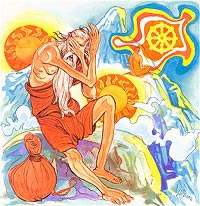THE
BUDDHIST ONLINE GOOD NEWS LETTER 27 03 2012 LESSON 563 FREE
ONLINE
eNālāndā
Research And Practice UNIVERSITYThrough http://sarvajan.ambedkar.org
ABHIDHAMMA RAKKHITA
Dhammapada
Verse 115 Bahuputtikattheri Vatthu Life Of One Who Knows The Teaching is Noble

Verse
115. Life Of One Who Knows The Teaching is Noble
Though one should live a hundred years
not seeing Dhamma Supreme,
yet better is life for a single day
seeing Dhamma Supreme.
Explanation: A single day’s life of a seer of the Noble Teaching
of the Buddha is by far greater than the life of a hundred years of a person
who does not see the Noble Teaching.
Dhammapada
Verse 115
Bahuputtikattheri Vatthu
Yo ca vassasatam jive
apassam dhammamuttamam1
ekaham jivitam seyyo
passato dhammamuttamam.
Verse 115: Better than a hundred years in the life of a person
who does not comprehend the Noble Dhamma (Dhammamuttamam), is a day in
the life of one who comprehends the Noble Dhamma.
1. dhammamuttamam: the Noble Dhamma or the Highest Dhamma
(the Nine Transcendentals). The Nine Transcendentals are: four Maggas, four
Phalas and Nibbana.
The Story of Theri Bahuputtika
While residing at the Jetavana monastery, the Buddha uttered
Verse (115) of this book, with reference to Bahuputtika, a mother of many
children.
Once in Savatthi, there lived a couple, with their seven sons
and seven daughters. All the children got married and the family was doing
quite well. Then, the father died and the mother kept all the property without
giving anything to the children. Her sons and daughters wanted the inheritance,
so they said, to their mother, “What benefit do we get from our property?
Can’t we make it multiply? Can’t we look after our mother?” They said such
things again and again so their mother thought that her children would look
after her, and she finally divided up the property without leaving anything for
herself.
After the division of the property, she first went to stay with
her eldest son, but her daughter-in-law complained and said, “She has come
and stayed with us, as if she has given us two shares!”, and such other
things. So, Bahuputtika went to stay with her second son, and the same things
were said. Thus, she went from one son to another, from one daughter to the
next; but none of them was willing to take her on for a long stretch of time
and none paid her due respect.
The old lady was hurt and felt bitter against her children; she
left her family and became a bhikkhuni. Because she was a mother of many
children she came to he known as Bahuputtika. Bahuputika realized that she
became a bhikkhuni only in her old age and that she must not be negligent, but
must make use of the remaining period of her life to the utmost. So, for the
whole night, she meditated on the Dhamma taught by the Buddha. The Buddha
seeing her from the Jetavana monastery, through supernormal power, sent forth
the radiance and appeared seated in front of her. Then the Buddha said to her, “The
life of one who does not practise the Dhamma taught by me is useless, even if
he were to live for a hundred years.”
Then the Buddha spoke in verse as follows:
|
Verse |
End of Chapter Eight: The Thousand (Sahassavagga)
